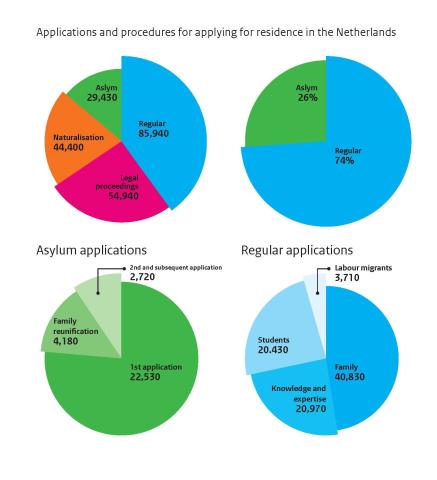The 28 April 2025 edition of the Business Newsletter is online
The latest Business Newsletter is available for recognised sponsors and concerns employment.
The total number of applications for residence received by the IND has increased for the third year in a row. As a result, the workload also grew further in 2019. For example, the number of people applying to become Dutch through naturalisation has significantly increased. This is clear from the IND's annual figures.
The IND received 44,400 applications for naturalisation in 2019, compared with 26,080 in 2018. This increase is related to the high asylum influx in 2015. It concerns many people from Syria and Eritrea who were granted residence permits at the time. They are now eligible for naturalisation if they meet the requirements. The IND approved 97% of naturalisation applications in 2019.
The IND saw an increase in applications in 2019 on all fronts. About three quarters of the applications for residence consist of applications for regular residence in the Netherlands, for example for study, work or family reunification. The number of IND decisions is also growing. This can be seen, for example, in the total number of documents issued to foreign nationals by the IND: 268,530 in 2019 compared to 237,800 in 2018.
Due to staff shortages, the IND has not always been able to decide on applications in a timely manner. Measures have therefore been announced to increase the decision-making capacity of the IND, in particular to reduce lead times for asylum applications (in track 4). There has also been an increase in the number of legal proceedings concerning IND decisions: 54,940 in 2019, up from 46,590 in 2018. 92% of asylum cases and 83% of regular cases are upheld in court.
For regular residence in the Netherlands an increase in the number of applications can be seen in all areas: family migration, knowledge migration, students and start-ups. Applications from labour migrants have increased by about 25% to 3,710. A total of 85,940 regular applications were submitted in 2019 for the above residence purposes.
The total number of asylum applications fell slightly in 2019, from 30,370 to 29,430. However, the number of first asylum applications increased to 22,530. On the other hand, there was a decrease in the number of second and subsequent asylum applications. The number of family members travelling for family reunification decreased the most, from 6,460 to 4,180. This decrease stems from the lower number of approved asylum applications in recent years.
For the IND, the year 2019 was not only about factual increases. As of 1 May 2019, for example, the IND's Managing Director was given the mandate to assess whether a distressing situation exists in a first application. The discretionary power of the Secretary of State for Justice and Security was abolished as of 1 May 2019.
A lot has happened in other areas as well. For example, the IND granted residence permits to 569 asylum children because of the ending of the children's pardon. In addition, the IND contributed to the Programma Flexibilisering Asielketen (Flexible Asylum Chain programme), which aims to improve the Dutch asylum process. A concrete change is that since 1 July the IND is no longer holding interviews for repeat asylum applications which do not have a chance of being approved. In future, repeat applicants will also have to report in person at Ter Apel.
Special efforts were made in the run-up to Brexit. All UK nationals living in the Netherlands (more than 45,000) received a temporary residence permit from the IND in March. This was necessary because of the possibility of a no-deal Brexit. In October, a temporary residence permit was also granted to UK nationals who registered in the BRP at their town hall after March 2019.
Through EASO (the European Asylum Support Office), the IND supported the asylum process in 2019 at the Greek and Italian hotspots in Athens and Rome. This mainly involved contributing asylum experts.
